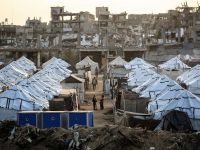Sudanese President Omar Al Bashir and John Garang, leader of the rebel Sudan People's Liberation Movement (SPLA), agreed at a regional summit Saturday to work towards a comprehensive ceasefire in Sudan's 18-year-old civil war.
"The warring parties have committed themselves to work towards a comprehensive ceasefire agreement, but it was not possible to have it today," Kenyan Foreign Minister Bonya Godana said after a regional peace summit hosted by President Daniel arap Moi.
Khartoum had unilaterally called a "comprehensive ceasefire" but it was rejected by the SPLA, which is made up of various animist and Christian tribes from southern Sudan and has been fighting domination by the Muslim, Arabized north since 1983.
The war and attendant famine and disease has claimed up to 1.5 million lives, with at least another four million displaced, humanitarian sources say.
Godana read a summit statement saying that the two parties had committed themselves to having permanent negotiating teams in Nairobi to carry on negotiations.
The one-day summit was held under the aegis of the regional Inter-Governmental Authority on Development (IGAD), of which Moi is the chairman.
Presidents Omar Guelleh of Djibouti and Yoweri Museveni of Uganda attended the summit along with Prime Minister Meles Zenawi of Ethiopia.
Eritrean President Isaias Afeworki, who had confirmed participation, did not show up.
Opening the summit, Moi called on Bashir and Garang to "engage in sustained negotiation with greater determination."
Moi acknowledged that the peace process had made only "modest progress" in recent years.
The Kenyan president listed four main obstacles to peace: eligibility to vote in a self-determination referendum for the south; separation of religion and state; the system of government to be installed during an interim period, and the sharing of resources.
He called on the Khartoum government to make "a definite commitment to the separation of religion and state within an appropriate federal constitutional framework," saying this would "enable us to overcome one of the most difficult stumbling blocks".
Newly discovered underground oil wealth in the south of Africa's largest country has fanned the civil war, in which humanitarian organizations accuse the government of massive rights violations against the rebels.
Garang said Saturday that a ceasefire could only be negotiated with the government if it stopped the activities of oil companies in Sudan: "a cease-oil is part of the essence of ceasefire because oil kills in Sudan."
"The government has to stop the evictions of the civil population to give room to oil companies. It is not only about stopping the shooting," said the SPLA leader.
On Monday, 50 humanitarian organizations and emergency relief groups also launched a campaign to freeze the activities of oil companies in Sudan, which became an oil exporter in September 1999.
With reserves estimated at more than one billion barrels, crude output is expected to rise to 400,000 barrels per day (bpd) in the next few years from current production of some 200,000 bpd, according to estimates from the Center for Strategic and International Studies in Washington.
Garang also said other rebel forces, particularly the National Democratic Alliance (NDA) must also be included in a ceasefire, otherwise the government would simply concentrate its forces against the NDA.
Meanwhile, an SPLA spokesman said the group had captured the strategic town of Raga, in the province of Bahr Al Ghazal, but government forces "are continuing their attacks and their bombings" in spite of their declaration of a unilateral ceasefire.
IGAD, which comprises Djibouti, Eritrea, Ethiopia, Kenya, Somalia, Sudan and Uganda, has been pursuing peace efforts since 1993, but most initiatives have ended on the rocks.
The heads of state resolved at the summit to reconvene in the Kenyan capital in two months to review progress on the negotiations – NAIROBI (AFP)
© 2001 Al Bawaba (www.albawaba.com)







